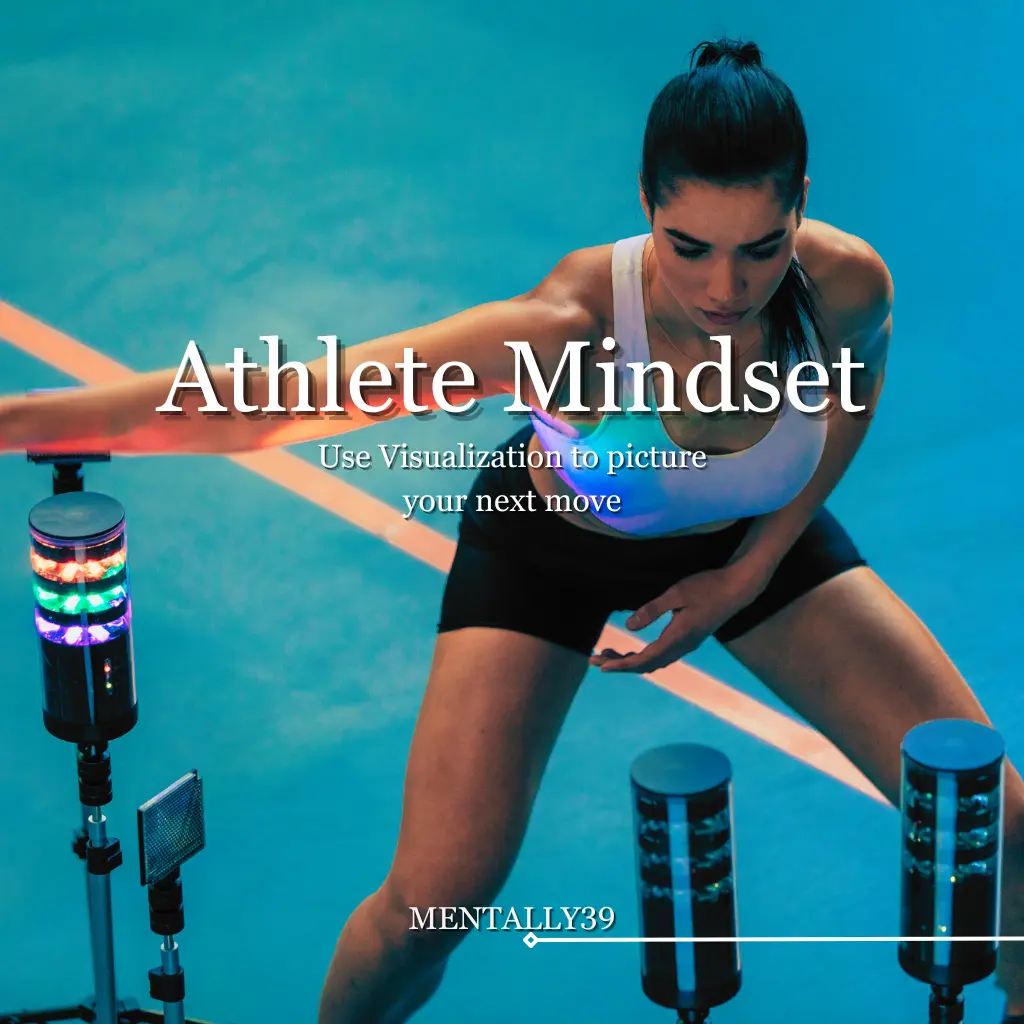Table of Contents
Becoming a great athlete isn’t just about being physically strong. It also takes a strong, tough athlete mindset. Athletes who do well and achieve big things know their thoughts and feelings are powerful.
They work hard to develop an athletic mindset so they can overcome challenges and do their best on a daily basis. Many talented athletes who possess natural physical abilities don’t live up to their potential. Technical ability in training doesn’t help if it can’t be carried through to competition. There are many examples of less physically gifted athletes becoming elite.
They don’t just rely on their natural talent; instead, they focus on improving their skills over a long time. Even if someone is naturally gifted, they might not do as well if they can’t perform when it matters most. Many athletes who weren’t as physically gifted still became the best elite athletes, consistently performing at a high level against top competition and lesser-ranked opponents.
This article will examine proven strategies to help you develop an unwavering athlete mindset and improve your mental game through expert coaching.
If you love playing sports and want to improve, these tips can help you develop a strong mental game. By using these techniques, you can overcome challenges and perform better, whether you’re a pro athlete or play for fun.
What is an athlete mindset, and how can it be developed?
The athlete mindset encompasses traits such as discipline, resilience, focus, and determination. It can be developed through consistent practice, setting goals, visualizing success, surrounding oneself with positive influences, and embracing challenges as opportunities for growth.
The Power of the Mind: Unleashing Your Athletic Potential
Athletes have a lot of power in their minds that they might not realize. Doing well in sports isn’t just about being strong – it’s also about using your brain to its full potential. When you unleash this power, you can do things you never thought were possible.
The best athletes are able to get over tough obstacles and keep going even when things get hard because they have a lot of mental strength.
If you can learn to control your thoughts and focus on what you want to achieve, you can reach peak performance and become one of the greatest athletes.
Understanding Mental Strength
Being a great competitor isn’t just about being physically strong. It also requires mental toughness, which means handling stress, bouncing back from setbacks, and staying focused and determined when things get tough.
Mental toughness is a skill, not something you’re born with, and you can get better at it with practice and hard work. To develop an athlete’s mindset, you need to have toughness; you need to learn how to stay calm under pressure, overcome self-doubt, and push yourself to do your best.
Being patient is important, too. You can try things like meditation, yoga, or breathing exercises, such as Wim Hoff, to help you stay calm and focused. By developing your mental toughness, you can unlock your full potential as an athlete and perform at your best.
The Growth Mindset of Athletes: Embracing Challenges
When trying to become a great athlete, it’s important to have a “growth mindset.” This means believing you can get better at things if you work hard enough instead of thinking you’re just born with certain abilities. A strong, persistent mindset offers the next levels of confidence few people have experienced the next day.
You should also have humility, which means knowing what you’re good at and what you need to work on in the first place. Athletes with a strong mindset don’t give up when things are hard – they see it as a chance to learn, improve, and take it to the next level, embracing teamwork and the challenges it brings.
Young athletes can achieve almost anything they want by working hard, having the right attitude, embracing humility, and practicing positive realism.
Visualizing Success: Harnessing the Power of Imagery
When you want to become a better athlete, one thing you can do is visualize yourself succeeding. This means picturing yourself doing well in your sport. Doing this helps your brain and body prepare for success.
Visualization is kind of like creating a plan in your head. When you imagine yourself doing your sport perfectly, it can help you focus better and feel more confident. This is because you start to believe in yourself and your abilities. The best athletes in the world all use this technique: golfers, tennis players, and race car drivers visualize their shots or race track. This is one reason they can reach the highest levels, and showcase a high-level performance.
Goal Setting: Setting Clear Objectives
To become a great athlete, it’s important to set clear goals that you can work towards. These goals should be specific, measurable, attainable, relevant, and time-bound. Setting short-term and long-term goals can help you stay motivated and see your progress.
Short-term goals can be simple things like getting better at something or learning a new skill within a certain time frame. Long-term goals help you see the bigger picture and set the stage for ultimate success.
It’s important to challenge yourself, but make sure your goals are realistic and match your abilities. Celebrate small wins along the way to stay inspired and positive.
Persistence – Embracing Failure
Falling short doesn’t mean the end, but can actually help you reach success. To be a great athlete, it’s important to accept loss. Don’t let setbacks bring you down; use them as a chance to learn and grow.
When you face defeat, it’s important to reflect on what went wrong and why it happened. This will help you identify the areas where you need to change and evolve. Rather than focusing on the negatives, look for solutions and ways to make changes that can lead you toward future success. Remember, learning from your mistakes and working on your craft is key.

Developing Resilience: Success and Failure
To succeed in the long term, athletes must be strong in mind and emotions. This is called resilience, which is the ability to keep going even when things are tough. Resilience is important because it helps competitors overcome challenges and difficulties.
One essential aspect of being resilient is changing your attitude towards failures. Instead of viewing them as insurmountable obstacles, the elite athlete mindset sees them as opportunities for growth and learning. They understand that defeat is just one step toward achieving success. This helps to build self-confidence in their skills. Thus, their performance will improve.
By embracing losses as a means of learning and being open about their vulnerabilities, athletes can take control of their mental fortitude and find ways to improve in the future. In other words, champions comprehend that success does not just come from avoiding loss. Rather, it stems from their response to defeat. They have the work ethic to push themselves and focus on the next race or competition.
Successful people know that defeat is necessary for personal growth and true success. The finest athletes in the world who have achieved greatness say that success depends on how they react to failure. They believe that failure is a natural part of the journey towards success. In other words, success and defeat are connected, and one cannot exist without the other.
The Role of Discipline
Athlete mindset is all about consistency is very important for achieving success in sports. It means always being dedicated and consistently improving your performance, no matter what sport. This includes following your training plan, staying healthy, and avoiding things that might hurt your progress. Being consistent is key to becoming a great athlete.
You must keep practicing, working out, and pushing yourself to improve daily. If you do this consistently, your training will become second nature, and you’ll improve over time. Continually focus on positive thoughts and look to the next game. Work even harder, and do what you need to improve.
Self-Talk: Shifting Negative Thoughts
Our inner dialogue has a profound impact on our athletic performance. By cultivating positive self-talk, we can harness the power of our thoughts and propel ourselves towards success. Self-talk involves the conscious practice of replacing negative thoughts with empowering affirmations.
Caving to self-doubt and negativity is easy when faced with challenges or hard obstacles. However, by actively challenging and reframing these negative thoughts into positive affirmations, we create the best way to a mental environment fostering strength and growth.
Instead of saying, “I can’t do this,” we can replace it with “I am capable of overcoming any obstacle.” This shift in self-talk boosts confidence and enhances focus and motivation.
Finding Motivation:
To be a great competitor, motivation is critical. Your love for the sport and desire to succeed can greatly help with this. Passion and inner drive keep you going, even when things get tough. Focus on your goals and keep pushing yourself to reach them.
To stay motivated in high school sports, consider why you chose to play and imagine where it could take you. Surround yourself with positive people like coaches or teammates who also love the sport.
Make a motto that reminds you of your goals, and say it every day. Remember, motivation comes from inside. Use your passion to push yourself towards success in sports.
In Conclusion
Having an athlete mindset takes time and effort, but it’s possible for anyone who’s willing to work for it. Use the strategies discussed in this article to reach your full potential in your sport. Success requires mental strength, overall health, and well-being.
Take on challenges, imagine yourself succeeding, set clear and attainable goals, and believe in yourself. With the right mindset and focus on well-being, you can overcome any obstacle and become the athlete you were meant to be. Go out there with confidence and let your natural talent shine – the world is waiting for you!

20+ Years as a Special Education Teacher
NASM Certified Nutrition Coach,
Certified Trauma Informed Trainer
Mindset and Motivation Master Life Coach
